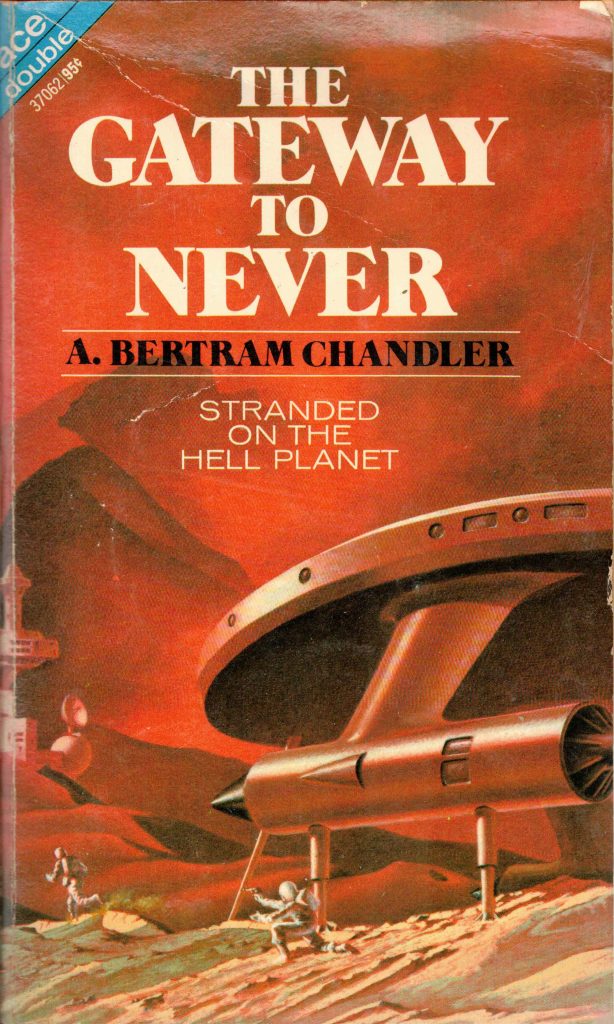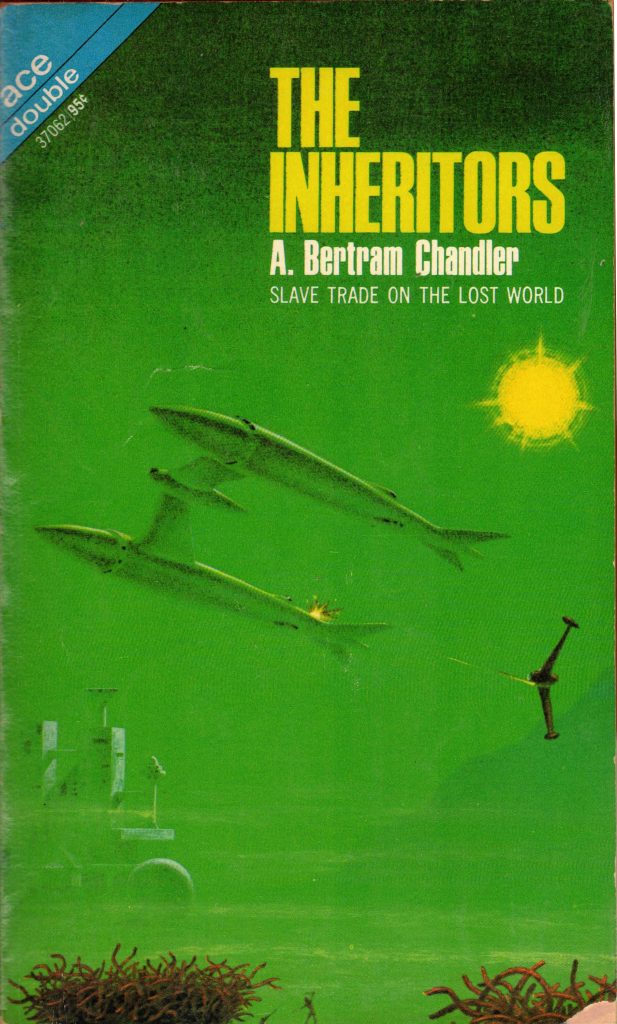Ace Double Novel 37062: The Inheritors / The Gateway To Never, by A. Bertram Chandler

Just a quick note about these two short novels that make up an Ace double that I recently devoured after pulling it down from my shelves. The book, an Ace Double published in 1972, presents two science fiction stories about the naval spaceman John Grimes written by an old sea dog himself, A. Bertram Chandler. Both tales were fairly fun, and neither was entirely forgettable (as some Ace Double entries are wont to be). I read them in reverse chronological order, as far as the internal timeline of the stories are concerned, but think that that may have made my reading more pleasurable, as I suspect that the late reveal of a major plot point might have been obvious to me if I had read the books in their presumed order. (By the way, though the main character in these stories has quite a number of years between the earlier tale and the later—John Grimes is a mere Lieutenant Commander in The Inheritors and has attained the rank of Commodore in The Gateway To Never—both of these novels were published the same year, at the same time, in the same book, this particular Ace Double.)
As written by the seaman-author Chandler, John Grimes is Hornblower in space, though where C.S. Forester’s hero has for his flaws a tin ear and a predilection for seasickness, Mr. Grimes has only the usual sailor’s lust for the ladies. Grimes happily finds himself on ‘clothing optional’ worlds in both stories, though he does the dirty only once, to his almost immediate regret. But like Forester’s famous British officer of Napoleonic Era—who, as everyone knows, was the inspiration for Captain Kirk of the starship Enterprise—John Grimes is given difficult assignments far from official help or hindrance, and must make tough decisions with limited resources while threading problems logistical, military, ethical, bureaucratic, and legal. Especially the last two. A. Bertram Chandler uses his science fiction hero to look at sometimes thorny issues, and though his views are sometimes as predictably patriarchal as his views on women’s breasts (he likes them ‘firm and full’, unsurprisingly), his voice is sometimes a quaint call from the latter half of the Twentieth Century reminding us that issues of rapidly changing society are better served by honest dialogue, rather than strident demagoguery.
In The Gateway To Never, an older and perhaps wiser Commodore John Grimes is working with the Customs officials detested by most right-thinking sailors to investigate the scourge of drugs. Yes, this was written in 1972 … and it shows. There is a fair amount of back and forth about different societies’ view of mind-altering substances, and Grimes tends to side with a much more laissez-faire attitude towards the SF wacky tobaccy du livre: “dreamy weed”. Until, that is, a spaceman who has indulged takes a spaceship on an unauthorized joyride while having a flashback, endangering lives, the ship, and the spaceport. Grimes goes undercover and attends a rave (that’s what I call it), and then travels to deep space to a literal ‘hell planet’ (you can see it called that on the cover blurb above), where he fights smuggling while making some slight pontifications about freedom of choice and like that. The philosophy is a little trite, but the action is all right, and the plot never lets the thinking get in the way of its forward momentum. The ending seemed a little tacked on, but you can’t have everything.

The other novel, The Inheritors, features a much younger Lieutenant Commander Grimes given command of a survey ship charged with reestablishing contact with a ‘Lost Colony’, a world colonized in an earlier age of space exploration but only recently rediscovered. There are two other ships contending with the Federation naval craft, a representative of a large trading fleet and another merchant ship captained by a man perhaps piratical, certainly trimming his sails close to the winds of legality. In this story, there is a bit of discussion of slavery—the author’s view is that it is bad—as well as the smash-up that ensues when one society is breached by another, more technologically advanced.
But this was a good world. It could be improved—and what planet could not? But would the reintroduction of machinery improve it? The reintroduction not only of machinery but of the servants of the machine, that peculiar breed of men who have sold their souls to false gods of steam and steel, of metal and burning oil, who tend, more and more, to degrade humanity to the status of slaves, to elevate the mindless automata to the status of masters.
Grimes gets wistful, not knowing that nowadays there’d be an app for that
The discussion here is a bit more pedestrian than in The Gateway To Never, as when Grimes’s second in command keeps harping about slavery and urging his captain to stop it. Oh, did I mention that the second in command is a black man? Whose “eyes and teeth were very white in his black face as he smiled mirthlessly”? Well, he is, and they are, and that’s that. There is little nuance in this tale, and I had to check twice that it was published at the same time as the other novel, which seems positively subtle compared to The Inheritors. Still, the preaching stays at an acceptable level, and is certainly no more disruptive to the overall story than were the humanist homilies of the original Star Trek.
In conclusion, both of these stories were fun, fast-paced, and left me wanting to read more about the career of Mr. John Grimes, at whatever rank. The science fiction is good, with some interesting speculations on various faster-than-light drives and some rather nostalgic ideas about genetics. Not that you couldn’t poke holes in the science, if you had a mind to. This isn’t Hal Clement. These are just some sea stories set in space, but they hew to the rich tradition of such tales. And while A. Bertram Chandler may not be Joseph Conrad, he spins a pretty good yarn.